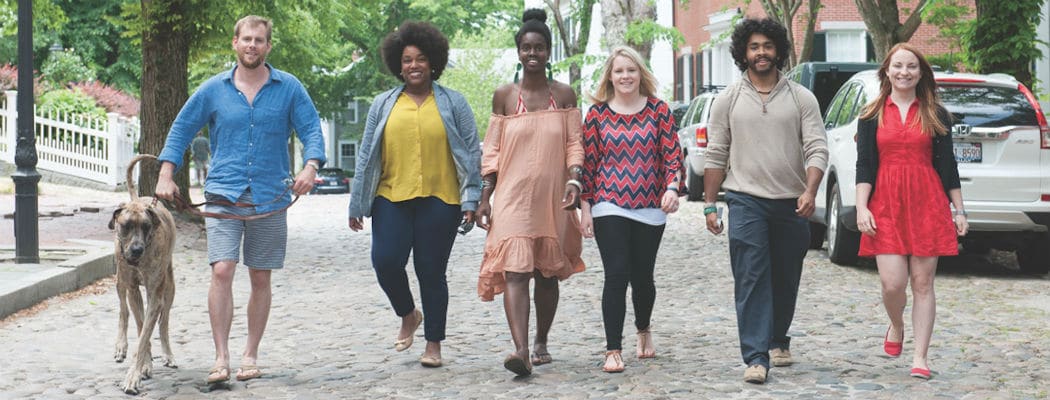How a group of young island professionals are trying to solve Nantucket’s housing crisis.
 Justin Taylor calls himself a “young creative.” At twenty-four years old, he’s the co-founder of Lean Guerrilla, an island-based tech consulting company. He’s socially conscious, sharp witted, an innovative thinker and like many others his age, he’s struggling to find an affordable place to live on Nantucket. Last fall, Taylor assembled what he describes as a “tribe” of young creatives, comprising like-minded professionals who came together weekly to exchange ideas, learn from one another and brainstorm solutions to the housing crisis. After several meetings, they came up with a cooperative housing model to purchase and share a home on Nantucket.
Justin Taylor calls himself a “young creative.” At twenty-four years old, he’s the co-founder of Lean Guerrilla, an island-based tech consulting company. He’s socially conscious, sharp witted, an innovative thinker and like many others his age, he’s struggling to find an affordable place to live on Nantucket. Last fall, Taylor assembled what he describes as a “tribe” of young creatives, comprising like-minded professionals who came together weekly to exchange ideas, learn from one another and brainstorm solutions to the housing crisis. After several meetings, they came up with a cooperative housing model to purchase and share a home on Nantucket.
“Cooperative housing isn’t for everyone, but it’s ideal for people who want to be involved with their neighbors in creating a community,” says Taylor. He and the other members of his tribe have spent the last few months carefully mapping out the logistics of purchasing a property under the non-equity cooperative structure, whereby occupancy rights are granted to members of the household, similar to having a lease. The owner entity is a corporation, with each member paying a monthly fee to cover the mortgage, taxes, insurance and incidentals. “A lot of people who want to live in the home are okay with owning the operations of the home, but don’t want to own the home,” says Taylor. A bonus of the non-equity setup is that members do not lose their first homebuyers’ status.
 At its core, the cooperative living arrangement Taylor has in mind will be autonomous and self-governing. He and the six committed members have devised a governing structure that outlines the roles and responsibilities of each person living in the home, yet he is quick to point out that most house rules will be modifiable by vote. The goal is that the home will have a large enough yard so that the members can plant a garden, keep bees, compost and work toward living as self-sustainably as possible. Depending on the makeup of the household, there will be single or double bedrooms, a large living room where members can gather and a large dining room for shared meals. Ideas born during these dinners will be nurtured. If one member wants to convert the basement into a music studio, for instance, the group will come together to discuss. “When members want to explore,” says Taylor, “they will know they have this community to turn to.”
At its core, the cooperative living arrangement Taylor has in mind will be autonomous and self-governing. He and the six committed members have devised a governing structure that outlines the roles and responsibilities of each person living in the home, yet he is quick to point out that most house rules will be modifiable by vote. The goal is that the home will have a large enough yard so that the members can plant a garden, keep bees, compost and work toward living as self-sustainably as possible. Depending on the makeup of the household, there will be single or double bedrooms, a large living room where members can gather and a large dining room for shared meals. Ideas born during these dinners will be nurtured. If one member wants to convert the basement into a music studio, for instance, the group will come together to discuss. “When members want to explore,” says Taylor, “they will know they have this community to turn to.”
Laura Cunningham is one of the four core members working on the governing structure and bylaws for the Project. She and her husband own a home, but have real concerns about their long-term future on the island. “Why would I want to stay here if my community of people can’t stay?” she asks. “That would be a reason that I would leave. There are a lot of us involved who really care about keeping young people here.” The objectives of the project are multi-faceted. While taking a step toward solving the housing crisis, members of the group are equally concerned with preserving their community and see a cooperative-style living arrangement as a way to replicate community culture in the home. Thus far, the approach to making the project a reality has been systematic and thorough, as one might expect with the development of any new business model.
 Taylor and the core members have budget templates and have considered a number of different options for funding. At press time, they were preparing to ask the Affordable Housing Trust Fund for a $100,000 grant that if awarded, will go toward the 20% down payment. “While we are not going to solve the housing challenge here with one solution, I think this can work for this group and potentially others,” says Tucker Holland, a member of the Affordable Housing Trust Fund. “We are going to need a dozen thoughtful approaches, maybe more.”
Taylor and the core members have budget templates and have considered a number of different options for funding. At press time, they were preparing to ask the Affordable Housing Trust Fund for a $100,000 grant that if awarded, will go toward the 20% down payment. “While we are not going to solve the housing challenge here with one solution, I think this can work for this group and potentially others,” says Tucker Holland, a member of the Affordable Housing Trust Fund. “We are going to need a dozen thoughtful approaches, maybe more.”
Taylor and his creative tribe are also planning fundraisers and looking for allied lenders. “We are mitigating the risk as much as possible,” he says. “We are in motion to get the purchasing process going.” Barring lack of funding or any unforeseen obstacles, they may be well positioned to do just that. They have identified two properties, have six committed members, and are set to begin interviewing applicants for the three remaining spots. They would like to move into their new home in September. Once they are settled, they hope they will be asked to share their model so that it becomes one viable solution to the affordable housing problem. As Justin Taylor insists, “We want to spark a new mindset of how to live on Nantucket.”






